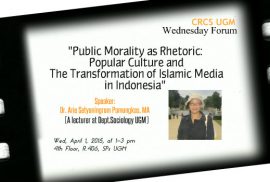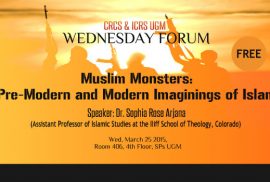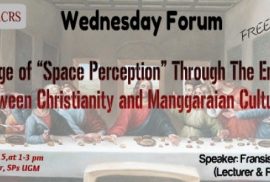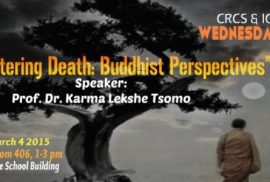 Abstract:
Abstract:
For the past two decades, Islam in Indonesia has been at the forefront of the production and consumption of popular culture. Contemporary forms of Islamic pop culture mobilize a sense of nostalgia since Islam was very much marginalized especially during the authoritarian regimes in post-colonial Indonesia. Meanwhile pressures to uphold public morality derive from Da’wa practices underlying the value of ‘amr ma’ruf nahi munkar’ (enjoining good and forbidding wrong) – this phrase becomes a central doctrine for public morality and the key rhetorical struggles promoted by Islamic media including those adopting pop style .
This rediscovery of Islam not only benefits political Islam activities, it induces a greater need to explore new activities in the cultural, aesthetic, legal and intellectual realms to justify and celebrate newly acquired privileges, and to express new identities and aspiration, and to expand politico-economic positions.
Speaker :
 Dr. Arie Setyaningrum Pamungkas, MA is a lecturer and researcher at Dept.Sociology Gadjah Mada University Yogyakarta Indonesia. She obtained BAin Sociology in 1998 from Gadjah Mada University and MA in Sociology and Cultural Studies in 2003 from The University of Sydney, Australia. Her PhD is in Southeast Asian Studies from Humboldt University of Berlin in 2014 on dissertation titled ‘The Dakwah Media in Post Suharto Indonesia: From Politics of Identity to Popular Culture.’
Dr. Arie Setyaningrum Pamungkas, MA is a lecturer and researcher at Dept.Sociology Gadjah Mada University Yogyakarta Indonesia. She obtained BAin Sociology in 1998 from Gadjah Mada University and MA in Sociology and Cultural Studies in 2003 from The University of Sydney, Australia. Her PhD is in Southeast Asian Studies from Humboldt University of Berlin in 2014 on dissertation titled ‘The Dakwah Media in Post Suharto Indonesia: From Politics of Identity to Popular Culture.’
 Salah satu capaian penting reformasi di Indonesia adalah tumbuhnya masyarakat madani (civil society) yang kuat. Namun, beberapa di antara organisasi masyarakat madani yang paling efektif dewasa ini justru adalah kelompok-kelompok Islamis garis-keras yang mendakwahkan intoleransi dan menyebarluaskan kebencian. Di beberapa wilayah, seperti Jawa Barat dan seputar Jakarta, organisasi-organisasi ini terbukti amat memengaruhi agenda kebijakan publik, dengan mendesak pemerintah—baik di tingkat lokal maupun nasional—untuk menerapkan pandangan mereka mengenai moralitas dan pemahaman mereka mengenai ortodoksi. Meskipun mengusung agenda-agenda yang antidemokrasi, semua organisasi di atas justru memanfaatkan ruang-ruang bebas yang disediakan demokrasi.
Salah satu capaian penting reformasi di Indonesia adalah tumbuhnya masyarakat madani (civil society) yang kuat. Namun, beberapa di antara organisasi masyarakat madani yang paling efektif dewasa ini justru adalah kelompok-kelompok Islamis garis-keras yang mendakwahkan intoleransi dan menyebarluaskan kebencian. Di beberapa wilayah, seperti Jawa Barat dan seputar Jakarta, organisasi-organisasi ini terbukti amat memengaruhi agenda kebijakan publik, dengan mendesak pemerintah—baik di tingkat lokal maupun nasional—untuk menerapkan pandangan mereka mengenai moralitas dan pemahaman mereka mengenai ortodoksi. Meskipun mengusung agenda-agenda yang antidemokrasi, semua organisasi di atas justru memanfaatkan ruang-ruang bebas yang disediakan demokrasi.
Pertanyaannya, apakah organisasi-organisasi itu tumbuh berjalan seiring dengan meningkatnya konservatisme sosial masyakarat Indonesia, atau karena koneksi-koneksi politik tingkat tinggi yang kuat? Mengapa mereka tampak lebih efektif dalam advokasi mereka dibanding organisasi-organisasi lainnya? Bagaimana demokrasi mengatasi kekuatan-kekuatan anti-demokrasi yang menggerogotinya itu?
Disisi yang lain Konflik keagamaan sering dikaitkan dengan kondisi politik lokal setempat. Secara langsung atau pun tidak, politik identitas menjadi isu sensitif, khususnya pada proses pemilihan kepala daerah. Meskipun kedua hal itu tidak selalu berhubungan, namun kebijakan pemerintah terutama pada masa sebelum atau sesudah transisi akan mempangaruhi kondisi konflik keagamaan. Program Studi Agama dan Lintas Budaya (CRCS) UGM menerbitkan serial laporan kehidupan beragama terkait dengan Politik Lokal dan Konflik Keagamaan yang akan dilaunching pada diskusi ini.
Kegiatan ini diselenggarakan oleh Program Studi Agama dan Lintas Budaya bekerjasama dengan Pusat Studi Agama dan Demokrasi (PUSAD) Paramadina, Jakarta.
Kedua buku bisa diunduh dengan mengklik judul berikut ini:
 Abstract
Abstract
This presentation examines the history of the Western imagination about Islam. Throughout history, Muslim men have been depicted as monsters. The portrayal of humans as monsters helps a society delineate who belongs and who, or what, is excluded. Even when symbolic, as in post-9/11 zombie films, Muslim monsters still function to define Muslims as non-human entities. These are not depictions of Muslim men as malevolent human characters, but rather as creatures that occupy the imagination — non-humans that exhibit their wickedness outwardly on the skin. They populate medieval tales, Renaissance paintings, Shakespearean dramas, Gothic horror novels, and Hollywood films. In her book, Muslims in the Western Imagination, Dr. Srjana examines the dehumanizing ways in which Muslim men have been constructed and represented as monsters, and the impact such representations have on perceptions of Muslims today.
 Speaker:
Speaker:
Dr. Sophia Arjana is Visiting Assistant Professor of Islamic Studies at the Iliff School of Theology in Denver, Colorado. She has just published her first book, Muslims in the Western Imagination (Oxford, 2015), a study of imaginary Muslim monsters in the West. Dr. Arjana has also written on race and Orientalism, Jewish and Islamic liberation theology, Islamic pilgrimage, and postcolonial liturgy.She is currently co-authoring a book on female Muslim superheroes in comic books, graphic novels, and television cartoons. Her next major project focuses on pilgrimage traditions outside of hajj and the ritual objects associated with these journeys.

Abstract
The encounter between Christianity and Manggaraian people has transformed a lot of aspects of traditional indigenous life of Manggaraian people. One aspects in which we can see this traditional life of Manggaraian people is through its oral tradition. Here I focus on myth and the related ritual of Manggaraian people.
In this study I want to answer this main research question: Do Manggaraian traditional myths and rituals from the earliest recorded records, still play an important role in the present Manggaraian life? This question will be derived in those following derivative questions. 1. What are the most important myths and rituals and theme in the recorded tradition? 2. Are they still influential? 3. Have they been changed through interaction with catholicism? 4. Has Catholicism in Manggarai been affected by these myths and rituals and practices also? Here I will focus in this discussion on the derivative question number three. And my answer is an affirmative one: There is a change in the space-perception of Manggaraian people due to the encounter with Christianity.
Presenter:
 Fransiskus Borgias. M, Lecturer and Researcher at Philosophy and Theology Department of Catholic University of Parahyangan Bandung. Study philosophy in STF Driyarkara Jakarta (BA). Studied Theology in Major Seminary Sancti Pauli Kentungan Yogyakarta (S1). Study masteral for intercultural theology in Radboud University Nijmegen, Nederland. Ph.D.,Candidate in ICRS Yogya. Write 10 books and translate 8 books. Visiting Researcher at Theology Department of Georgetown University, Washington DC, USA.
Fransiskus Borgias. M, Lecturer and Researcher at Philosophy and Theology Department of Catholic University of Parahyangan Bandung. Study philosophy in STF Driyarkara Jakarta (BA). Studied Theology in Major Seminary Sancti Pauli Kentungan Yogyakarta (S1). Study masteral for intercultural theology in Radboud University Nijmegen, Nederland. Ph.D.,Candidate in ICRS Yogya. Write 10 books and translate 8 books. Visiting Researcher at Theology Department of Georgetown University, Washington DC, USA.
Batas waktu 11 April 2015
Program Studi Agama dan Lintas Budaya (Center for Religious and Cross-cultural Studies/CRCS) Sekolah Pascasarjana, Universitas Gadjah Mada, membuka pendaftaran untuk:
Sekolah Pengelolaan Keragaman (SPK) Ke-VI
Yogyakarta, 19 Mei – 31 Mei 2015
Sekolah Pengelolaan Keragaman mengundang aktifis dan pengajar/peneliti yang mempunyai komitmen untuk mengembangkan dan mengintegrasikan teori dan praktik terkait isu keragaman (dalam arti luasnya yang mencakup advokasi dan pembuatan kebijakan dalam masyarakat majemuk) dalam kerja/studi mereka. Setiap peserta diharapkan terlibat dalam kelompok penelitian mengenai isu-isu keragaman di daerah masing-masing setelah selesai mengikuti sekolah ini.
Kami menerima peserta dari:
ABSTRACT:
Death is an inescapable reality for all human beings, but we generally try to avoid the topic. If we’re in denial, though, how will we deal with death when the time comes? The Buddha’s confrontations with old age, sickness, and death turned him toward the spiritual quest.
After his awakening, he taught many methods of meditation, including contemplations on death and dying. As Buddhism spread to countries throughout Asia, attitudes toward death and dying inevitably changed, influenced by indigenous beliefs and practices. This presentation will explore basic Buddhist teachings on death and afterlife, as well as cultural variation.
SPEAKER:
Karma Lekshe Tsomo is a professor of Theology and Religious Studies at the University of San Diego where she teaches Buddhism, World Religions, and Death and Afterlife. She received a doctorate in Comparative Philosophy from the University of Hawai‘i, with research on death and identity in China and Tibet.
She is co-coordinator of the 14th Sakyadhita International Conference on Buddhist Women and director of Jamyang Foundation, an innovative education project for women in developing countries. Her publications include Into the Jaws of Yama: Buddhism, Bioethics, and Death and nine edited volumes on women in Buddhism.







